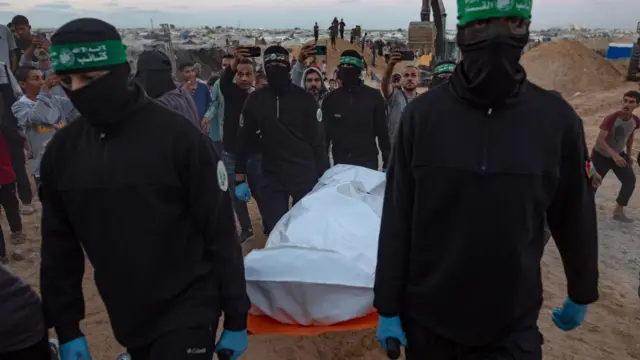
Hamas on Thursday transferred the bodies of two Israelis it said were hostages who died in captivity, a day after a fragile ceasefire was jolted by Israeli strikes across the Gaza Strip.
Prime Minister Benjamin Netanyahu’s office said Israeli forces received the bodies via the International Committee of the Red Cross in Gaza and would bring them into Israel for identification.
Under the truce deal, Hamas freed all living hostages in exchange for nearly 2,000 Palestinian prisoners and wartime detainees, while Israel pulled back troops, paused offensive operations and expanded aid deliveries. Hamas also agreed to hand over the remains of all 28 hostages confirmed dead in exchange for 360 Palestinians killed in the war; as of Thursday it had delivered 15 bodies.
Israel has accused Hamas of moving too slowly to return the remaining bodies. Hamas says locating and retrieving all remains will take time given the scale of destruction.
The dispute over the bodies is one of several hurdles complicating U.S. President Donald Trump’s push for a permanent end to the Gaza war, alongside unresolved questions over Gaza’s future administration and demands that Hamas disarm. Each side has accused the other of breaching the ceasefire.
From Tuesday into Wednesday, Israel struck back after a Palestinian attack that killed an Israeli soldier. Gaza health authorities said 104 people were killed in the bombardments, including 46 children and 20 women. Israel said the strikes targeted militants.
Before dawn on Thursday, witnesses reported about 10 Israeli airstrikes east of Khan Younis in southern Gaza and tank shelling east of Gaza City in the north. The Israeli military said it conducted “precise” strikes on “terrorist infrastructure that posed a threat to the troops” still deployed in parts of the enclave. No casualties were immediately reported.
Gaza residents voiced fear the truce could collapse. “We’re scared that another war will break out… We’ve suffered two years of displacement,” said Fathi al-Najjar, a displaced resident in Khan Younis.
The conflict has uprooted most of Gaza’s more than two million people—many of them multiple times—and large numbers have yet to return home, wary of renewed fighting.
